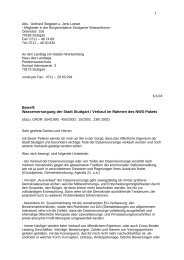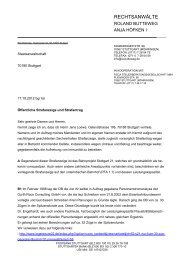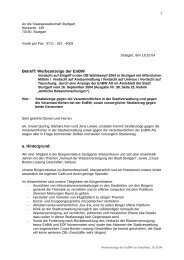- Page 1 and 2:
J E N S L O E W E WATER ABLAZE THE
- Page 3 and 4:
WATER ABLAZE © 2010 Jens Loewe Wit
- Page 5 and 6:
CONTENTS 1 FOREWORD__13 2 THE FINAN
- Page 7 and 8:
9 THE NEOLIBERAL CONSPIRACY -THE RO
- Page 9 and 10:
14 USEFUL WEBLINKS WITH COMMENTS__2
- Page 11 and 12:
With this in mind, I have made a de
- Page 13 and 14:
There are numerous examples to prov
- Page 15 and 16:
solely from its trade in derivative
- Page 17 and 18:
THE STRUGGLE FOR WATER 3 We citizen
- Page 19 and 20:
y Alexander the Great whilst cleani
- Page 21 and 22:
several hundred metres, because loc
- Page 23 and 24:
aim is to spread. Genetically-engin
- Page 25 and 26:
well aware of this fact, of course,
- Page 27 and 28:
3.5 The Climate Change - Pretext fo
- Page 29 and 30:
main building and some of them were
- Page 31 and 32:
take into account those positive re
- Page 33 and 34:
4.2 The Philippines - Manila and th
- Page 35 and 36:
“Reconstruction Programme”, an
- Page 37 and 38:
to halt the construction of the can
- Page 39 and 40:
transparency and public participati
- Page 41 and 42:
and irrigated for sugar cane planta
- Page 43 and 44:
At the present moment in time, i.e.
- Page 45 and 46:
Excavators dig out a new river bed
- Page 47 and 48:
Protests in Sobradinho in December
- Page 49 and 50:
The sociocultural damage which the
- Page 51 and 52:
ut also on the country’s cultural
- Page 53 and 54:
organisations to its cause, so that
- Page 55 and 56:
the architect of the scheme, Voith-
- Page 57 and 58:
4.8 Indonesia - Water Suppliers Dan
- Page 59 and 60:
not been delivered. In practice, ho
- Page 61 and 62:
ased on water rights the company ac
- Page 63 and 64:
their position - between the IMF, t
- Page 66 and 67:
WARS FOR WATER IN BOLIVIA 5 Evo Mor
- Page 68 and 69:
companies. Chile used the revenues
- Page 70 and 71:
the contract with Suez/Aguas del Il
- Page 72 and 73:
The institutions named here seem to
- Page 74 and 75:
country”. In reality, it has devi
- Page 76 and 77:
The GTZ, in consultation with the D
- Page 78 and 79:
5.3 From the Struggle for Water to
- Page 80 and 81:
just who is in greater need of deve
- Page 82 and 83:
who oppose President Evo Morales’
- Page 84 and 85:
philosophy that forms the foundatio
- Page 86 and 87:
A CITY’S MAD PRIVATISATION SPREE
- Page 88 and 89:
today - that Stuttgart’s water su
- Page 90 and 91:
6.2 The Strategy of Insidious Priva
- Page 92 and 93:
2004, these deals were finally decl
- Page 94 and 95:
thus became the 100 per-cent owner
- Page 96 and 97:
1.) Water belongs to the public. -
- Page 98 and 99:
liberalised because different suppl
- Page 100 and 101:
there can be no real democracy - is
- Page 102 and 103:
In October 2004, the Water Forum br
- Page 104 and 105: Turning these into private monopoli
- Page 106 and 107: not need to be reintroduced but the
- Page 108 and 109: “Bread for the World” and other
- Page 110 and 111: CROSS BORDER LEASING - FICTITIOUS D
- Page 112 and 113: of the transaction volume and the b
- Page 114 and 115: and 2003 - in other words, to almos
- Page 116 and 117: A protective human chain encircles
- Page 118 and 119: (not to mention a national bankrupt
- Page 120 and 121: to build a bridge in the grounds of
- Page 122 and 123: arrangement, these corporations, wh
- Page 124 and 125: partner offered to rescind the cont
- Page 126 and 127: • When CBL deals are in the proce
- Page 128 and 129: HOW POLITICS, THE BUSINESS WORLD AN
- Page 130 and 131: with one another. Under the motto
- Page 132 and 133: eal beneficiaries of this “develo
- Page 134 and 135: manner, as a great number of exampl
- Page 136 and 137: who, as early as 1903, developed th
- Page 138 and 139: epresents the Federal Republic of G
- Page 140 and 141: e successfully continued - which is
- Page 142 and 143: who have the necessary instruments
- Page 144 and 145: these interests continue to assert
- Page 146 and 147: organisations,48 all of which have
- Page 148 and 149: in January 1995 (see page 156). At
- Page 150 and 151: 9.7 The GATS Agreement The General
- Page 152 and 153: poses a minimum of restriction and
- Page 156 and 157: modified canola, which is why Monsa
- Page 158 and 159: the then French Foreign Minister, R
- Page 160 and 161: This document of ratification will
- Page 162 and 163: - which has meanwhile lost its “s
- Page 164 and 165: sents the interests of the business
- Page 166 and 167: associations which play no role at
- Page 168 and 169: and international level and in the
- Page 170 and 171: unspectacular title Public-Private
- Page 172 and 173: even further into the financial aby
- Page 174 and 175: get into the sewage disposal market
- Page 176 and 177: 1996 onwards, which resulted in the
- Page 178 and 179: means. Matters concerning the gener
- Page 180 and 181: that it would not have to pay back
- Page 182 and 183: same goals and striving to heighten
- Page 184 and 185: electricity and gas supplies as wel
- Page 186 and 187: the hammer and the community of Wan
- Page 188 and 189: comes to around €50,000, money wh
- Page 190 and 191: 10.11 The Anti-Privatisation Networ
- Page 192 and 193: The industrial nations continue to
- Page 194 and 195: EWG set the limiting value at 50mg
- Page 196 and 197: The production of fertilisers is in
- Page 198 and 199: are also poisoning our drinking wat
- Page 200 and 201: 11.5 A Century of Industry - A Cent
- Page 202 and 203: Brunswick against the Minister for
- Page 204 and 205:
11.7 Nuclear Weapons - Radioactive
- Page 206 and 207:
uranium enrichment, manufacturing t
- Page 208 and 209:
to its destination. Every single on
- Page 210 and 211:
Worldwide, there are 40,000 huge da
- Page 212 and 213:
are released, a greenhouse effect i
- Page 214 and 215:
12.1 Problems and the Search for Po
- Page 216 and 217:
lines. His high-tech “separation
- Page 218 and 219:
The council has no choice but to se
- Page 220 and 221:
the resultant financial damage - e.
- Page 222 and 223:
water in order to increase the sale
- Page 224 and 225:
In the Netherlands, a water act was
- Page 226 and 227:
As far as the pollution and contami
- Page 228 and 229:
13.6 Foreign Aid Programmes - Who A
- Page 230 and 231:
set in such a way as to relieve peo
- Page 232 and 233:
13.9 Alternative Methods of Supplyi
- Page 234 and 235:
USEFUL WEBLINKS WITH COMMENTS 14 14
- Page 236 and 237:
Center for Corporate Policy Non-pro
- Page 238 and 239:
sustainable manner and public, rath
- Page 240 and 241:
Inside the Bottle Project initiated
- Page 242 and 243:
Peoples Health Movement w w w . p h
- Page 244 and 245:
Shiva, Vandana Physicist, environme
- Page 246 and 247:
Water Privatization (Wikipedia) w w
- Page 248 and 249:
The Ecologist UK-based monthly maga
- Page 250 and 251:
Undercurrents Alternative news and
- Page 252 and 253:
decentralised water treatment, usua
- Page 254 and 255:
14.5 Useful Websites in German Arbe
- Page 256 and 257:
Stuttgarter Wasserforum is a citize
- Page 258 and 259:
evenue amounting to US$31∙4 billi
- Page 260 and 261:
which has aquired a number of water
- Page 262 and 263:
was charged with bribery and fined
- Page 264 and 265:
and gas to more than 30 million cus
- Page 266 and 267:
Suez Environnement Suez Environneme
- Page 268 and 269:
the firm announced a 31% rise in pr
- Page 270 and 271:
15.2 Water-Bottling Giants Coca Col
- Page 272 and 273:
PepsiCo Company PepsiCo Incorporate
- Page 274 and 275:
BusinessEurope After the ERT, this
- Page 276 and 277:
ERT European Round Table of Industr
- Page 278 and 279:
International Financial Services, L
- Page 280 and 281:
PricewaterhouseCoopers (PwC) One of
- Page 282 and 283:
WWC World Water Council Think tank
- Page 284 and 285:
H2O up for Sale - The Privatisation
- Page 286 and 287:
The Never Never Water By Alessandra
- Page 288 and 289:
fashionable panacea is privatisatio
- Page 290 and 291:
The series tells the dramatic story
- Page 292 and 293:
Cohen, Saul The Geopolitics of Isra
- Page 294 and 295:
Hinz-Karadeniz, Heidi und Rainer St
- Page 296 and 297:
Lenglet, Roger and Jean-Luc Touly L
- Page 298 and 299:
Pearce, Fred WATER - The Defining C
- Page 300 and 301:
Roy, Arundhati The Shape of the Bea
- Page 302 and 303:
von Arnim, Hans Herbert Das Europa-
- Page 304 and 305:
ANA Agência Nacional de Águas Bra
- Page 306 and 307:
BT Bacterium Thuringiensis Bacteriu
- Page 308 and 309:
the votes cast and establishes that
- Page 310 and 311:
ECB European Central Bank One of th
- Page 312 and 313:
EU Constitution Treaty establishing
- Page 314 and 315:
GMO Genetically-Modified Organism (
- Page 316 and 317:
IHK Industrie- und Handelskammer (G
- Page 318 and 319:
MSR Multistakeholder Review Study i
- Page 320 and 321:
covering the area to the east of th
- Page 322 and 323:
y the Bolivian government in the co
- Page 324 and 325:
SWAMP Sustainable Water Area Manage
- Page 326 and 327:
WSF World Social Forum Drafted as a
- Page 328 and 329:
UN-INSTRAW United Nations Internati
- Page 330 and 331:
Criminal Courts ICJ International C
- Page 332 and 333:
NOTES 18 1. UN prognosis of 2008; s
- Page 334 and 335:
23. Recommendations for resolutions
- Page 336 and 337:
in 2002 contains around 2,600 pages
- Page 338 and 339:
61. The lawyer John Roberts, presid
- Page 340 and 341:
ACKNOWLEDGEMENTS 19 The list of peo
- Page 342 and 343:
ABOUT THE AUTHOR 20 Jens Loewe live







